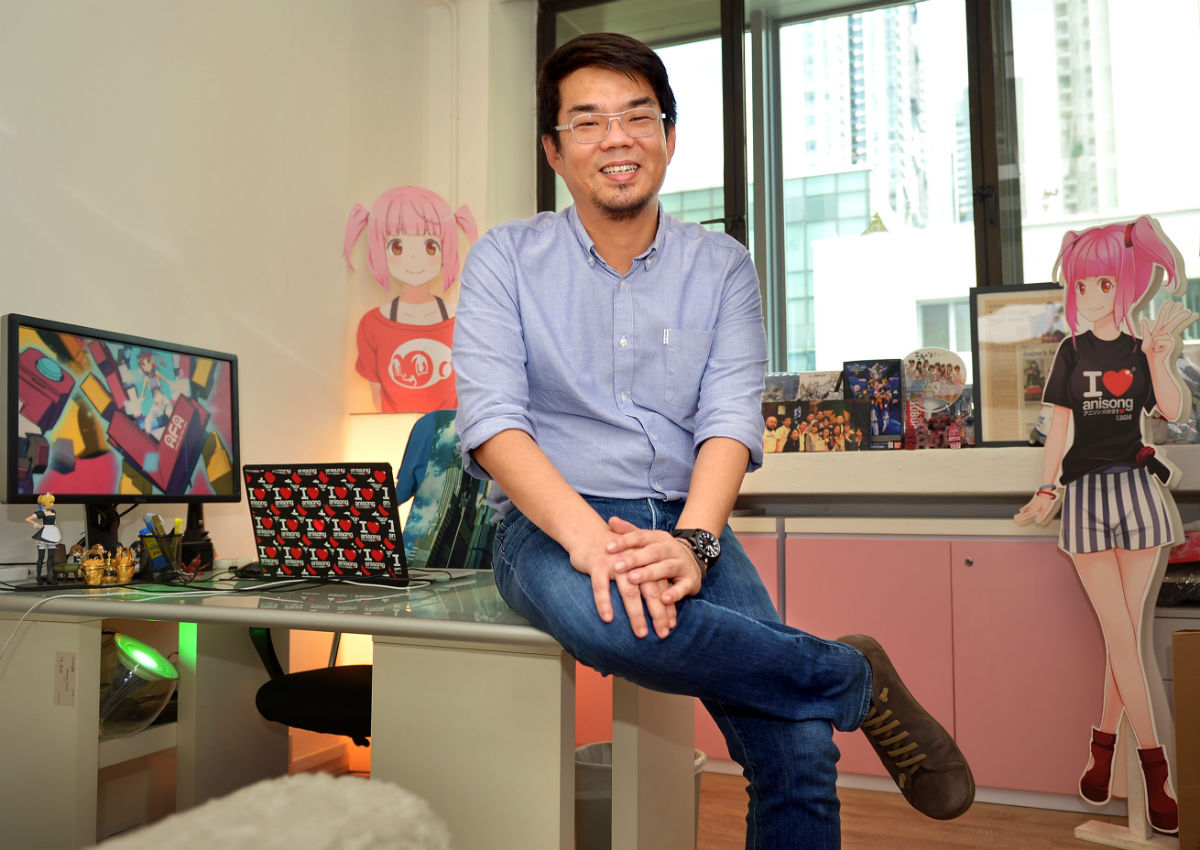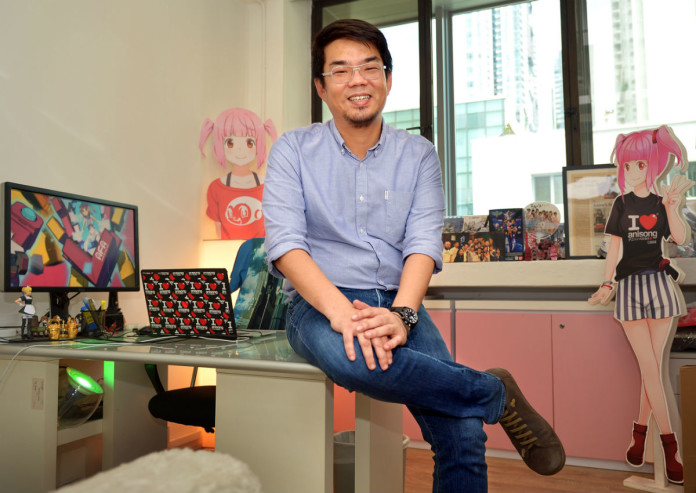Shawn Chin is living the ultimate fanboy’s dream.
As the founder and managing director of events company Sozo, which organises the massive Japanese pop culture event Anime Festival Asia (AFA) here, he gets to schmooze with the biggest names in anime and manga and has first-hand accessto related merchandise.
“It’s always important to have passion for what you do, but to get paid for it too? I couldn’t ask for more,” says the 42-year-old Singapore-born Malaysian, who concluded the ninth edition of the annual festival last night.
Speaking to The Straits Times from the Sozo office in Bukit Merah, Mr Chin is polite and soft-spoken, but also clearly passionate when talking about his work.
He cheerily takes out anime goodies lying around his office to show this reporter – from autographed boards gifted by anime theme-song singers to toy collectibles lining his cabinet shelves. He explains the origins behind each with meticulous detail, the way anyone would about his most prized possessions.
He is a long-time fan of anime, or Japanese animated productions, having followed them fervently since he was a child.
“I like all kinds of animation, but I always thought that there was something special about Japanese anime. They are good at telling uniquely Japanese stories and anime is seen more as an art form than just some kiddie cartoon,” he says.
His interest in the genre began after he caught anime shows such as Science Ninja Team Gatchaman (1972-1974) and Space Battleship Yamato (1974-1975) on television.
As he got older and had some pocket money to spare, he started renting anime series on video tape from neighbourhood video stores to fuel his appetite.
Never mind that most of the series available were at least three years behind the original broadcast in their native Japan.
He says: “Back then, that was the norm in Singapore.
You watched whatever you could get your hands on.
Things are different now, thanks to the Internet.
Fans here can now watch all the latest shows almost immediately after they are released in Japan.
This is really the best time to be an anime fan.”
Indeed, given how far from the mainstream anime was during his childhood, it would have been unlikely for an event such as AFA to achieve the same level of success back then, he says.
“For a long time, anime was seen as pretty niche in Singapore.
But that has since changed.
Because of how accessible it is now and the way social media works to share content, it is easier for all groups of people to enjoy it.
At AFA, you will see hardcore fans as well as families and casual visitors.”
The festival is the largest event in Singapore that deals with all forms of Japanese pop culture.
It not only spotlights anime, but it also features other Japanese products such as fashion and technological accessories, and stages Japanese pop concerts.
The edition over the weekend was the biggest to date, drawing an expected 100,000 visitors over three days and costing $2 million to produce.
That is a huge increase from the festival’s debut in 2008, when it had welcomed 27,000 attendees and cost $300,000 to put on.
Mr Chin says: “To be honest, I thought that only 5,000 people at most would show up that first year.
The fact that so many Singaporeans came encouraged us to keep doing this and the festival has been growing yearon year.”
He is pleased to add that many of the festival’s more recent visitors do not hail only from Singapore.
“We have Indonesian, Malaysian and even Japanese fans flying in now.
When we started, the Southeast Asian market for Japanese pop culture was untested.
“But the festival has proven that there is interest in Japanese anime and entertainment in Singapore and across South-east Asia.”
In fact, demand for the event has become so high in the region that Mr Chin started holding sporadic editions in cities such as Jakarta, Bangkok and Kuala Lumpur.
Next year, it will hold its first event in Hong Kong and there are plans to take the festival to the Philippines, Vietnam and China.
“Singapore will remain the showcase country where we try out new things first, but who knows where AFA can go to next.
It will be our 10th edition next year, so it’ll be a special year for us,”he says with a grin.
As experienced as he is in the anime business in South-east Asia now, he never planned for his career path to go this way.
He had always assumed that he would settle in Australia, after moving to Melbourne to live with his cousins at the age of 13.
When he completed primary school at Maris Stella here, his parents wanted him to pursue educational opportunities overseas and learn to live more independently, he says.
His Malaysia-born father is an architect and his Indonesian mother, an Australian-educated dietitian.
But school was never on the top of his priority list.
He signed up to study visual communications at RMIT (Royal Melbourne Institute of Technology) University and then at Monash University, but did not graduate from either.
He dropped out to work at an advertising agency instead. “I was a bit impatient,”hesays.
Seduced by the “excitement of the Internet”, he joined an Australian e-commerce company where he designed and marketed websites for clients.
“The idea of the Internet was not that prevalent at the time, so to get to work with e-commerce clients seemed rather cool,”he says.
When the company decided to set up a Singapore arm in 1996, Mr Chin, having grown up here as a child, was the boss’ natural choice to be relocated here to head operations.
Two years later, the company decided to cease its Singapore operations, but the time here was enough to convince Mr Chin to stay put. “I felt like there was a lot of exciting things happening in Asia and I didn’t wantto leave.”
He bought the Singapore business over from his Australian employers and continued on his own.
Heady with entrepreneurial spirit, he set up an events company on the side as well, which went on to organise large-scale events such as New Year’s Eve beach dance music parties on Sentosa.
Things looked to be going great until the dotcom crash in 2001, which led him to fold his Internet-based business.
To earn a more stable income, he returned to his advertising roots and joined Japanese company Dentsu to head its integrated marketing department here.
That move turned out to be the start of the best things to come for him.
“That was where I got my first exposure to Japanese entertainment clients. I thought most Singaporeans were into K-pop at the time, but I discovered there were many people who were also big fans of Japanese entertainment,suchas anime.”
Combining his love for anime with his events background and Internet savvy, AFA was born.
“I had been to many large-scale anime events before in Japan, such as Anime Japan in Tokyo. I wondered why we never attempted something similar here, especially when I found so many blogs dedicated to anime coming from this part of the world,” he says.
Despite the higher-than-expected turnout for the first AFA, the event failed to turn a profit.
But Mr Chin was so confident of the idea that he decided to not just hold more editions, but also invest his energy in the event full time.
He quit Dentsu to set up his own company, Sozo, to focus on AFA. “It turns out that AFA would be in the red for the next two years as well, but what we heard from fans was that there was a clear demand for the event to continue. They showed us that the market was there to do something like this, so I didn’t want to end it just like that. I guess I just had this belief that it would workout.”
It certainly did. Besides AFA’s growing success, Sozo, which means creation or imagination in Japanese, also organises other Japanese entertainment events here, such as J-pop concerts by popular acts Scandaland May’n,as well as roadshows showcasing Japanese pop culture products.
But AFA remains the company’s pride and glory.
Despite the recent competition with the entry of similar events such as C3 CharaExpo last year, AFA remains the premiere Japanese pop culture event in Singapore to many fans here.
Mr Brian Li, 48, a fan of anime series Gundam (1979-present) and who has been attending AFA every year since its debut, says: “There is always something unique for anime fans to look out for at AFA, whether it is limited-edition toys or famous guests, from anime series writers to seiyu (voice actors). The organiser is very good at keeping in touch with fans online to find out what we want and it caters to our needs.”
Despite the appreciation many anime fans have for AFA’s organiser, there is one person who is surprisingly nonchalant about it all: Mr Chin’s only child, 15-year-old Isaac.
Mr Chin, whose property agent wife Mary Hendro helps out with Sozo’s operationsfrom time to time, says with a laugh: “My son is more into video games than anime. Maybe when your parents are involved in it, it is considered very uncool.”

This article was first published on Nov 28, 2016.
Get a copy of The Straits Times or go to straitstimes.com for more stories.







